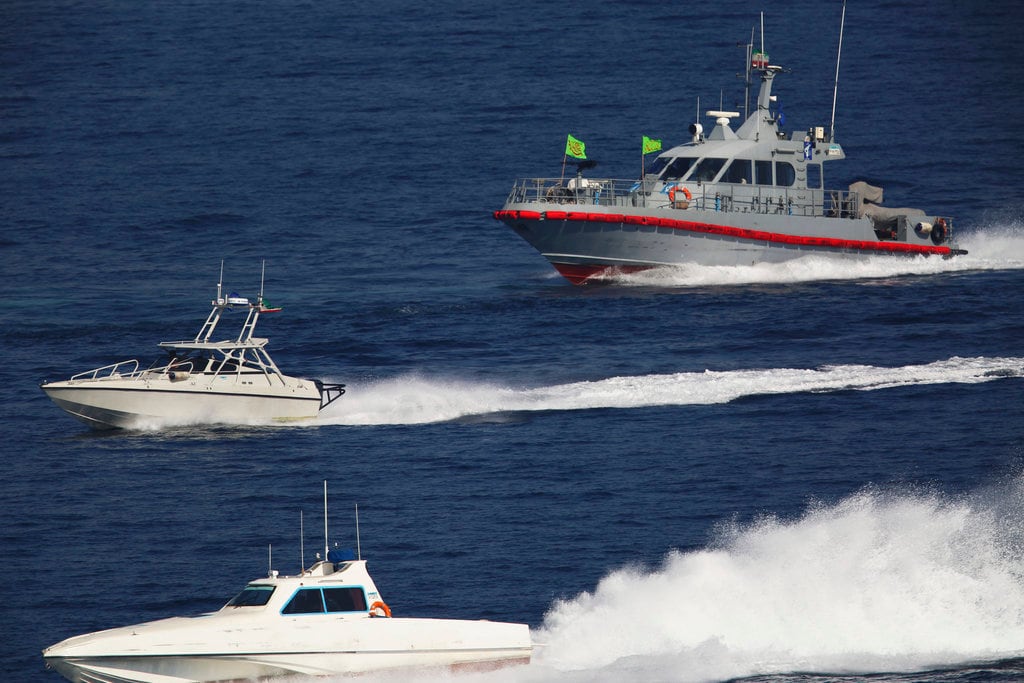Iran shouldn’t be surprised if next time one of its speedboats zigzags in front a U.S. ship in the Persian Gulf and it ends up blown out of the water, but it’s not a new rule of engagement.
That is the message from both senior Pentagon leadership and President Trump, a week after video surfaced of 11 Islamic Revolutionary Guard Corps speedboats swarming several Navy ships, prompting Trump to tweet a threat.
“I have instructed the United States Navy to shoot down and destroy any and all Iranian gunboats if they harass our ships at sea,” he wrote Wednesday.
Two senior Defense officials who briefed reporters on Wednesday could not confirm whether the tweet amounted to a direct order to commanding officers in the gulf.
“The president issued an important warning to the Iranians,” Deputy Defense Secretary David Norquist said. “What he was emphasizing is, all of our ships retain the right of self-defense.”
When asked whether the traditional harassment ― including years of approaches by these fast boats ― should now be met with lethal force, Norquist said he would not weigh in on “hypothetical” situations.
Historically, this is how they’ve been handled: A sailor on the bridge of a U.S. ship sees a fast boat approaching; the ship attempts to make verbal contact with the boat, either over radio, or, as it gets closer, loud speaker; if the boat continues to close in, or someone gets on the gun mounted to its bow, and especially if that gun is aimed at the ship, a warning shot is in order.
This was the case most recently in 2017, when the aircraft carrier Nimitz fired warning shots into the water near a group of Iranian fast boats.
Ships are technically allowed to use lethal force, but traditionally commanding officers have left that as a last resort.
RELATED

“How dangerous the interactions are is relative. This type of demonstrative action is something that was fairly common during the Cold War,” Anthony Cordesman, an Iran expert at the Center for Strategic and International Studies told Navy Times in 2016, after a series of close calls between U.S. ships and the Islamic Revolutionary Guard Corps in the gulf. “Whenever you want to assert yourself as a power you can do so fairly safely. The worst that happens is a limited combat action or a collision.”
But as tensions between Iran and the U.S. continue to grow, a deadly interaction could escalate to the same sort of exchange of fire that saw a top Iranian general killed in January, followed by a missile attack on an Iraqi base housing U.S. forces.
Trump clarified his tweet Wednesday evening in his nightly press conference from the White House.
“No, that’s the rules of engagement,” Trump said when asked if his tweet amounted to a change. “That’s a threat. When they get that close to our boat, and they have guns, they have very substantial weapons on those boats, but we’ll shoot them out of the water.”
It is true that shooting in self-defense is part of the U.S. military’s rules of engagement in the Persian Gulf, but the situation has historically not come to that. Whether through maneuvering or de-escalation, ships have been able to avoid collisions or other altercations.
If a ship’s CO did make the call to fire at a boat, it would be met with much scrutiny as to whether the danger at the time necessitated the risk of a deadly interaction with Iran.
While Trump’s tweet itself didn’t lay out a new procedure for COs, Defense Secretary Mark Esper told Fox News on Wednesday night, the issue is under review.
“We have been working this," he said. “We’re looking at making modifications to our practices to make sure that Iranians know that they need to stay clear of our warships and of our personnel.”
Tactics, techniques and procedures, as well as rules of engagement, are continuously under review.
It’s possible the Pentagon could decide to draw a red line of perhaps 20 yards from a ship, calling for warning shots or more in that scenario. It would still be up to a CO whether to take those shots, but in either case, his or her actions would be subject to an investigation and potential consequences.
“I‘m not going to get into the exact tactics," Esper told Fox News. “They need to be well warned — the Iranians— that we’re not going to tolerate that behavior.”
Meghann Myers is the Pentagon bureau chief at Military Times. She covers operations, policy, personnel, leadership and other issues affecting service members.




